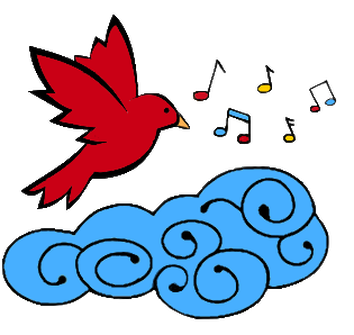|
The Music & Language Learning Center offers group classes and tutoring in several languages (Spanish, European Portuguese, Brazilian Portuguese, and French) and in various facets of music (Music History, Appreciation, Theory, Composition, and Conducting). Did you ever think about why music and language are linked together? Or how they are very much the same? In this blog, we are going to uncover the connections between music and language. As children, we learn certain words in one, and maybe two or more languages, so that we can communicate our needs (I'm hungry, I'm thirsty, etc.), our feelings (I'm happy, I'm sad, etc.), and other aspects of our lives to others. We also learn to read, so that we can learn more about the world. Music, like books, is something that we learn to read and can develop over time.
Henry Wadsworth Longfellow, the American poet wrote, “Music is the universal language of mankind.” What did he mean by that? I can think of a few ways. One would be in reading music. Many musical terms use foreign terms in different languages like French, German, and Italian. Do you need to know how to speak any of these languages fluently to be able to read music? No, but having a basic understanding of what these musical terms mean will help you develop your musical knowledge so you can express yourself musically. Music also uses a lot of symbols. If we know what those symbols mean (from note and rest values to phrasing, to pitches, to performance instructions) - in other words - if we can read these musical symbols, we know what to do with them with the proper training needed to be able to interpret them. I am a musician (pianist and vocalist). If I found myself in a concert hall, church, or somewhere with a piano (or even a keyboard), I could play my instrument and people could hopefully enjoy what I play. I could sing a song and people could hopefully enjoy what they hear (and maybe recognize it). Music is a universal language that connects cultures. While sometimes we may not share a common spoken language, we would be able to communicate through music. The pianist would play the notes on the page, and follow the singer's lead, and together, they could share their music. Would I be able to say thank you? Maybe not in words, but in bows or smiles – yes! I've sung and played duets, trios, and in larger ensembles with others. In those performances, whether we discuss it or not, we are thinking, sometimes breathing, and performing as one. So, is music a language? What do you think? Learn more about our course offerings at the Music & Language Learning Center, and schedule a free consultation with us today!
0 Comments
Leave a Reply. |
AuthorWrite something about yourself. No need to be fancy, just an overview. Archives
June 2024
Categories
All
|
Music & Language Learning Center |
Music Classes |
Language Classes |
MUSIC AND LANGUAGE LEARNING CENTER 2024



 RSS Feed
RSS Feed

